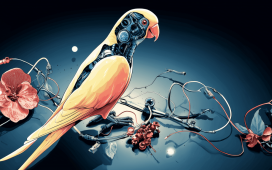Missed the GamesBeat Summit excitement? Don’t worry! Tune in now to catch all of the live and virtual sessions here.
I watched Season 6 of Black Mirror streaming series on Netflix. While these sci-fi horror shows are always tough to watch, I find them occasionally brilliant and often memorable. But it’s like tough medicine to watch horror shows while waiting for the lessons they offer about technology.
This season, which arrived in June, was a shortish five episodes. It was the first new season since before the pandemic in June 2019. The real world was so bad, I suppose, that we didn’t need a new season of Black Mirror.
But there was clearly some fodder for the writers. We could see the politics of Trumpism made it into one of the episodes and the cruelty of modern social media and docudramas made it into another. Perhaps the only further artifact of real life that seeped into it from the pandemic was a much darker view of the world and humanity than in the past shows, if that is even possible.
Some of the past episodes always made me think about the use of technologies like surveillance, social media, and even the simulation theory – which holds that we’re living in a simulation. I like to always think about the crossover of science fiction, technology and games. Black Mirror remains one of the key ways I can stay in touch with all of those elements at the same time.
But this season seems different, as many of the episodes are set in the past. They’re speaking about society at a particular point in time, rather than our future.
Season 6 by episode
1. Joan Is Awful

An average woman is stunned to discover a global streaming platform has launched a prestige TV drama adaptation of her life — in which she is portrayed by Hollywood A-lister Salma Hayek Pinault. The comedy of this episode involves the self-referential nature of bringing Netflix (dubbed Streamberry) itself into the plot. AI can take Joan’s life and turn it into a reality show episode on the same day. The licensing issue highlighted in this episode is not one that would hold up in court, but it’s something to be aware of as we embrace AI in the future. While it’s disturbing, this show could be called comic for its lack of violence.
2. Loch Henry

A young couple travel to a sleepy Scottish town to start work on a genteel nature documentary, but find themselves drawn to a juicy local unsolved crime story involving shocking events of the past. The twist in the plot was very ingenious, but it’s so very dark and ugly as a story. It also lacked a tech angle.
3. Beyond the Sea

In an alternative 1969, two men on a perilous astronaut mission wrestle with the consequences of an unimaginable tragedy. It gets into transhumanism and what it means to inhabit someone else’s doppelganger body. Two astronauts get to revisit Earth in virtual “replicas” of themselves, downloading their consciousnesses into copies of themselves at home. But something goes wrong with one replica, and then the astronauts contend for the remaining one. I found it to be compelling as a story, though so very hopeless that it almost made me stop watching.
4. Mazey Day

A troubled starlet is dogged by invasive paparazzi while dealing with the consequences of a hit-and-run incident. It’s a supernatural horror story, not a technology story. It explores just how low the paparazzi will go in pursuing their celebrity photos. And so it seems out of place as a Black Mirror episode.
5. Demon 79

It takes place in Northern England in 1979. A meek sales assistant is told she must commit terrible acts to prevent disaster in the future. Since she sees that future, she has to decide whether she should sacrifice the guilty people around her to prevent that future that seems all too close to the one we are living. It’s a supernatural story again, with no real relevance to technology today. And it’s got a dark ending that could be classified as comic to some folks.
My favorites

When I look back on past seasons, it’s easy to find memorable episodes. Season 3 was where it started to shine with Nose Dive, about a woman’s social media crash. Some of my favorite episodes of the past were San Junipero, which raised questions about what kind of digital memorial we should leave behind after we die. Season three also featured Men Against Fire, about the manipulation of what we see for military purposes, and Hated in the Nation, the one about bees.
My all-time favorites have to be San Junipero and Hated in the Nation because they made me think about the upsides and downsides of technology in new ways.
Season 4’s highlights included USS Callister, about a fan getting lost in a cinematic universe and Crocodile, about scrubbing the data in people’s memories to solve crimes. Season 5 favs included the Miley Cyrus episode about a robot replacement for a pop star, and Striking Vipers, about connecting in VR a little too much. All of these episodes were memorable. The special show Bandersnatch was good but a little less interactive than I would have liked as a gamer.
Given that history, I viewed this season as a disappointment. I think the shows were all good, but Mazey Day was simply a good supernatural horror story, with no real relevance to technology except the annoying pervasiveness of paparazzi and the tools they use and the choices they make. Demon79 also lacked a tech angle and relied heavily on the supernatural for its story. It was dark but wove in dark humor into its “nice” ending.
I think the reason I’ve tolerated the ugly horror of the show in the past is because it has always had the element of surprise, ingenious takes on technology, fine plot twists and understated comedy. In this season, it felt too dark, perhaps a reflection of my need for more uplifting entertainment in the wake of the pandemic. Any sensitive viewers should be aware of that. I certainly wouldn’t recommend watching them right before you go to bed.
My hope for these shows is perhaps the same that the creator, Charlie Brooker, has. He and co-creator Annabel Jones want to expose us to the downsides of technology. If we see the reflection of Black Mirror in our own lives, maybe we’ll find the White Mirror that represents the better path for technologists to follow. But for these lessons to stick with us, the shows themselves have to be entertaining.
GamesBeat’s creed when covering the game industry is “where passion meets business.” What does this mean? We want to tell you how the news matters to you — not just as a decision-maker at a game studio, but also as a fan of games. Whether you read our articles, listen to our podcasts, or watch our videos, GamesBeat will help you learn about the industry and enjoy engaging with it. Discover our Briefings.










